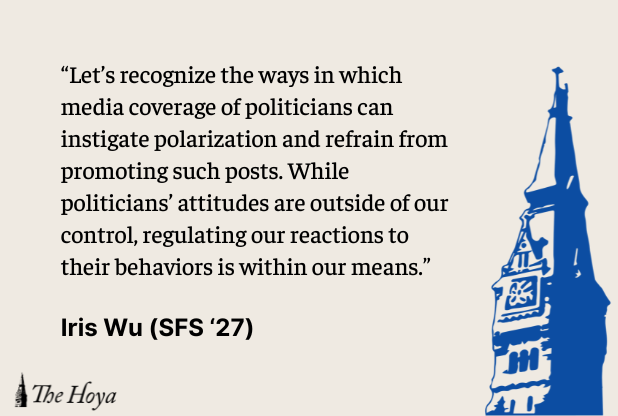I hate telling stories in front of big groups of people. As soon as I start to speak, I become conscious of the eyes studying me, and I feel an obligation to entertain. The strand of hair I found in my food yesterday becomes an entire wig, and last week’s mild case of the sniffles becomes a heavy bout of pneumonia.
There — I just did it again. When faced with an audience, we have this strange tendency to make ourselves into a spectacle. We evoke strong emotions for the sake of entertainment.
So it’s no wonder that, when surrounded by cameras and reporters, politicians do the same.
The involvement of cameras and reporters in politics are necessary to an extent. On one hand, transparency is an essential feature of a healthy democracy. The efficacy of our representative democracy relies on our ability to hold our lawmakers accountable. When politicians legislate in a public-facing manner, they feel a greater obligation to uphold their promises to their constituents. Not only does transparency function as a preventative measure against corruption, it also enables citizens to call their representatives to action if they fail to execute their promises.
Yet open government is a double-edged sword. When legislating in front of an audience, politicians feel compelled to sensationalize their legislation in a way that aggravates political polarization. As Georgetown University students, we happen to be part of the “audience” that politicians are appealing to. Given our role in enabling polarization, it is our responsibility to mediate our reactions to provoking political media.
This isn’t a criticism of the way in which politicians are portrayed in the media — it’s a questioning of the media coverage itself.
In 1976, in wake of the Watergate scandal, Congress passed several “sunshine reforms” — a set of regulations that opened committee meetings to public attendance and increased the number of publicized Congressional votes.
Since these reforms, polarization has shot up. According to a 2023 study by the Congressional Research Institute, since passing the reforms in the 1970s, the political distance between the Democratic and Republican parties has only risen. Before the 1970s, polarization had been on a downward trend.
Exposing legislative processes to the public was intended to combat government corruption. Yet, in practice, these reforms have tinged political negotiations with a sense of drama. Being conscious of an audience presence has prompted politicians to take more radical political stances.
Aware that their moves are being documented, representatives’ attitudes toward political negotiations become distorted, causing them to see legislating as a performance rather than a true negotiation. The presence of a camera shifts the political culture away from discussion and towards theater. And nothing makes for better theater than scuffles between radical zealots.
As they stray further to the extremes, politicians grow incapable of reaching across the aisle. Hyper aware of the fact that their party’s constituents are watching, politicians refuse to “give in” to the other side as a way of showcasing their loyalty to voters and securing reelection.
As the ideological distance between the two parties grows, conspiring with “the other side” has the potential to cost a politician their career. One doesn’t need to look further than Wyoming Republican Party exile, Former Rep. Liz Cheney (R-Wyo.), one of ten Republican votes to impeach Donald Trump and the former vice chair of the January 6 Investigation Committee. So it’s no surprise that in 2022, Cheney lost the Wyoming Republican primaries to a Trump-backed candidate. Cheney is a prime example of a contemporary politician whose efforts to act in a nonpartisan manner ruined her career.
Bipartisan collaboration was easier when dialogue was conducted in secrecy. Gordon Wood, a Republican staffer who worked on the 1972 Clean Water Act, recalled in a 2014 interview that negotiating the Clean Water Act behind closed doors allowed politicians to remove “their blue shirts and red neckties.” Without an audience watching, people and ideas alike could shed their party affiliations. Lawmakers could convene and discuss at the line, rather than scream at each other from the wings.
This isn’t to say that all legislating must be conducted behind closed doors. However, open government has sensationalized our legislation and polarized our politics. And the only people who can change this culture, other than the politicians themselves, are the people participating in it — including us.
One of the most visible ways in which we participate in politics is on social media. We like to repost news articles on our stories, criticize politicians in comments and circulate political posts. While all of these forms of civic engagement can be meaningful, they are only beneficial if we refuse to participate in them blindly.
Georgetown offers us a unique array of educational resources — it would be a mistake to let them pass us by. It’s not everyday that people get to attend a panel discussion on the Israel-Gaza conflict with experts in the field or hear directly from senators on state affairs. In addition to schoolwide events, student organizations like the GU College Democrats, GU College Republicans and the Georgetown Bipartisan Coalition are spaces for politically-minded students to challenge polarization. Georgetown isn’t the place to mindlessly consume sensationalized political content. There’s no excuse — on the Hilltop, the opportunity to resist radicalization is practically handed to us.
Let’s recognize the ways in which media coverage of politicians can instigate polarization and refrain from promoting such posts. While politicians’ attitudes are outside of our control, regulating our reactions to their behaviors is within our means. Don’t be a part of the system that distorts political discussion.
As the audience, the onus is on us to remain unphased. If we can’t prevent the root cause of the issue, let’s at least try to mitigate the effects.
Iris Wu is a first-year student in the School of Foreign Service.













